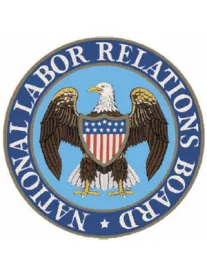Q: I am a nonunion employer. Does the National Labor Relations Board have the right to investigate my operations?
A: Most employers have heard of the National Labor Relations Board (NLRB or Board) and believe it applies just to employers who are either facing a potential union election or already have a unionized workforce. However, the NLRB has much broader jurisdiction over private-sector employers, and for practical purposes the Board has very broad jurisdiction and covers the majority of nongovernment employers with a workplace in the United States, including nonprofits, employee-owned businesses, labor organizations (unions), and even nonunion businesses and businesses in states with Right to Work laws.
The National Labor Relations Act (NLRA) was passed by Congress in 1935 with the intent that the United States would encourage collective bargaining by protecting employees’ (workers’) full freedom of association. The NLRA’s fundamental purpose to “protect workplace democracy by providing employees at private-sector workplaces the fundamental right to seek better working conditions and designation of representation without fear of retaliation.” 29 U.S.C. §§ 151-169.
Section 7 of the NLRA sets forth that employees have the right to self-organize, join a union, bargain collectively through an authorized representative and engage in other concerted activities for the purpose of collective bargaining, as well as the right to decide not to engage in labor organization activities.
Section 8 of the NLRA generally describes the right of workers (employees) to file unfair labor practices claims against their employer for interference with section 7 rights related to labor organizing and for discrimination or retaliation against an employee or employees for exercising their rights under the NLRA, not only related to labor organizing but also to complaining about working conditions such as wages, benefits, hours and so forth.
Jurisdiction over Most Private-Sector Employers
Most employers believe Board jurisdiction applies only to organizations that are facing a labor (union) organizing campaign or already have a union workplace. However, for practical purposes it includes most private-sector employers in the United States, and the Board has set forth broad jurisdiction over these employers. Specifically, the Board asserts jurisdiction over the following employers whether or not they are unionized.
Retailers
Employers in retail businesses fall under the Board’s jurisdiction if they have a gross annual volume of business of $500,000 or more. This includes employers in the amusement industry, apartment houses and condominiums, cemeteries, casinos, home construction, hotels and motels, restaurants and private clubs, and taxi services. Shopping centers and office buildings have a lower threshold of $100,000 per year.
Non-retailers
For non-retailers, jurisdiction is based on the amount of goods sold or services provided by the employer out of state (outflow) or purchased by the employer from out of state (inflow). Outflow or inflow can be direct or indirect, passing through a third company such as a supplier. The Board takes jurisdiction when annual inflow or outflow is at least $50,000.
Special Categories
-
Channels of interstate commerce: For businesses providing essential links in the transportation of goods or passengers, including trucking and shipping companies, private bus companies, warehouses and packing houses, the minimum is $50,000 in gross annual volume.
-
Health care and child care institutions: Hospitals, medical and dental offices, social services organizations, child care centers and residential care centers with a gross annual volume of at least $250,000 are under NLRB jurisdiction; for nursing homes and visiting nurses associations, the minimum is $100,000.
-
Law firms and legal services organizations: The minimum is $250,000 in gross annual volume.
-
Cultural and educational centers:For private and nonprofit colleges, universities and other schools, art museums and symphony orchestras, the annual minimum is $1 million gross.
-
Federal contractors: Private contractors who work for the federal government are under NLRB jurisdiction. In addition, all federal contractors are required by the Department of Labor to post a Notice of Employee Rights under the NLRA.
-
Native American/Indigenous People tribes: The Board asserts jurisdiction over the commercial enterprises owned and operated by Indian tribes, even if they are located on a tribal reservation. However, the Board does not assert jurisdiction over tribal enterprises that carry out traditional tribal or governmental functions.
-
Religious organizations: The Board will not assert jurisdiction over employees of a religious organization who are involved in effectuating the religious purpose of the organization, such as teachers in church-operated schools. However, the Board has asserted jurisdiction over employees who work in the operations of a religious organization that do not have a religious character, such as a health care institution.
The following employers also are explicitly excluded from NLRB jurisdiction by statute or regulation:
-
Federal, state and local governments, including public schools, libraries, parks, Federal Reserve banks, and wholly owned government corporations
-
Employers who employ only agricultural laborers, those engaged in farming operations that cultivate or harvest agricultural commodities or prepare commodities for delivery
-
Employers subject to the Railway Labor Act, such as interstate railroads and airlines.
As a result, most employers with a low gross threshold and even nominal interstate commerce are likely subject to facing complaints filed before the NLRB.
Complaint and Claim Avoidance
Given the broad jurisdiction asserted by the Board, employers should be aware that they are likely subject to Board jurisdiction. That said, good employment practices and employee relations are essential to avoid any complaints including those under the NLRA.
To avoid complaints, employers should follow these practices:
-
Open and clear communications with employees
-
Employees’ clear ability to raise issues and complaints with management including a delineation that if a supervisor is the issue, the employee is able to raise issues to upper management and any supervisor
-
Onboarding and continuing training on the ability to raise concerns about working conditions
-
Employees’ ability to freely discuss work conditions during nonworking time
-
Supervisors trained on employee relations and how to manage a workforce
-
Encourage and be respectful of differing opinions
-
Do not threaten employees who elect to voice concerns or have questions about workplace policies and programs
-
Share facts about the workplace such as wages, benefits and other policies and processes
-
Answer questions and conduct interviews in an open and non-adversarial manner
-
Treat all employees under the same standards and apply discipline and benefits in an equitable manner.
While the NLRB jurisdiction may subject employers to another agency where employees can make a complaint, exercising good basic employee engagement and relations will be critical to avoid these types of claims and issues.
Consult an experienced labor/employment professional if you receive an NLRB request for investigation or inquiry.



 />i
/>i

